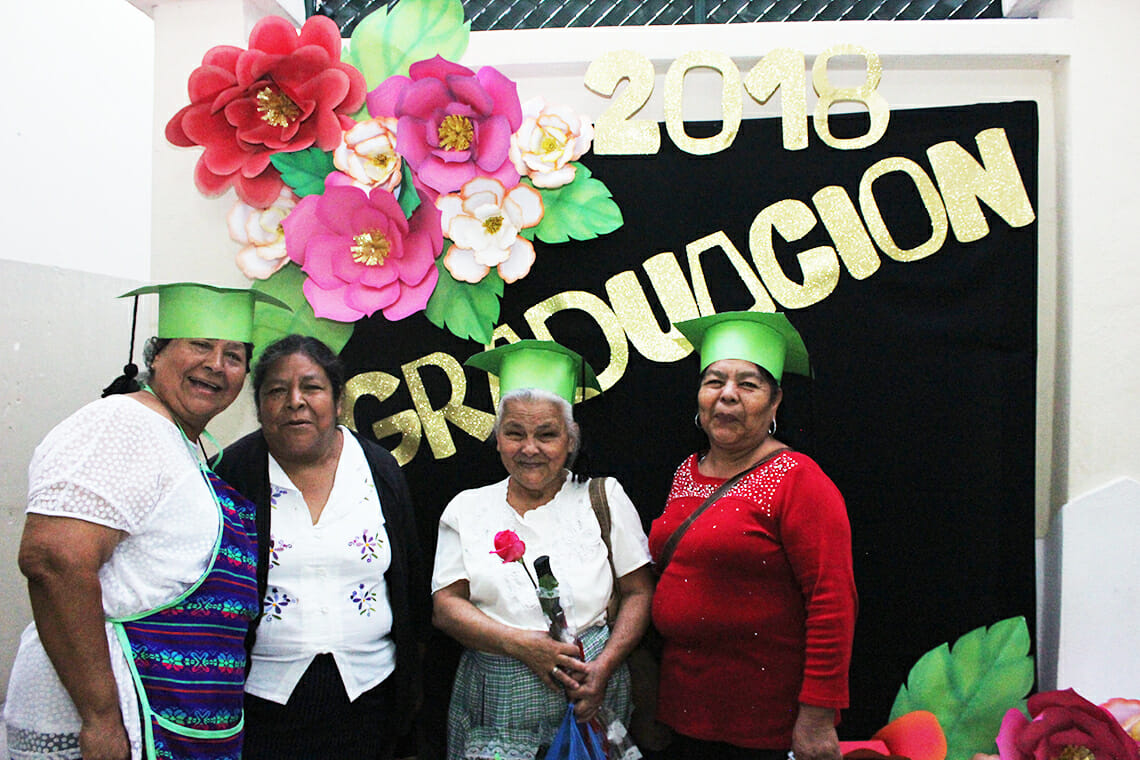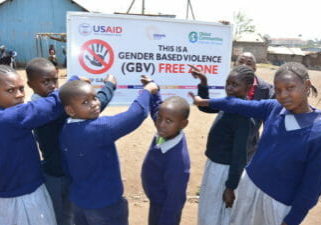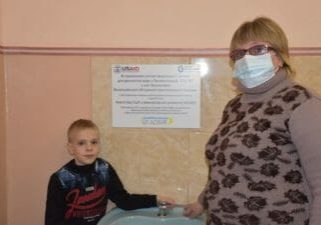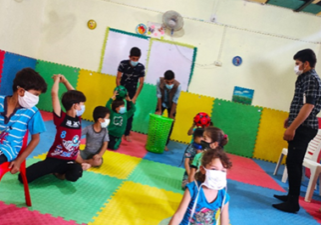News > Blog
Graduates Empowered to Set a New Pace for Women in Guatemala
Published 12/04/2018 by globalcommunities

Just over a year ago, Julia Xec could not read or write. But last week marked the start of a new chapter in her life.
The Guatemalan mother, who never had the opportunity to attend school before, was one of 191 women to graduate from a pilot program developed between Project Concern International (PCI) and Gap Inc. She now has the confidence, skills and support to be the author of her own story.
“I am very happy because now I don’t have to ask anyone to write down my name on my behalf,” said Xec, who runs a small bodega in Mixco with her husband. “I can sign my son’s school paperwork and read the messages I receive in my phone. I’m also able to be more involved in our store. I feel blessed. … I would like to be able to continue with a career that allows me to improve myself.”
Since August 2017, Xec has been part of a small group of women who meet on a weekly basis to learn how to build life skills, save money and share resources in ways that will help them improve personally, professionally and as a community. They call themselves “Mujeres con Vision Hacia la Lucha” (Women with a Vision to Strive) and are one of 16 groups in the Mixco and Villa Nueva municipalities of Guatemala who formed with support from PCI and Gap Inc.

Marta, Julia, Aury and Crisanta (l to r) are members of “Mujeres con Vision Hacia la Lucha” (Women with a Vision to Strive) in Mixco, Guatemala. Since August 2017, with support from PCI and Gap Inc., the group has met on a weekly basis to learn how to build life skills, save money and share resources in ways that will help them improve personally, professionally and as a community. Photo by Carmen Murguia/PCI Guatemala
The curriculum that served as the foundation of their meetings is based on a combination of Gap Inc.’s P.A.C.E. (Personal Advancement & Career Enhancement) program and PCI’s Women Empowered (WE) methodology. Through WE, women set up their own savings and lending group, complete with a set of bylaws, elected leaders and savings goals. With the addition of P.A.C.E., the women are trained on topics including communication, problem solving and decision making, time and stress management, healthy hygiene and sanitation, and financial literacy.
“We work in vulnerable communities in urban Guatemala where, culturally, women have been assigned to a role in their home and there is little investment or importance given to their education,” said Mabel Bejarano, who manages the WE-P.A.C.E. pilot program in Guatemala. “They are faced with so many responsibilities and challenges in life. Last week’s graduations were a celebration of their perseverance, their desire to grow and their inner potential as women.”
Maria Teresa de Marroquin, vice mayor of Villa Nueva, was one of several local government and business leaders who attended last Thursday’s WE-P.A.C.E. graduation in her municipality.
“When I arrived this morning, I could feel the level of empowerment of the women in this room,” Marroquin told the graduates, as each received a rose and certificate in honor of their achievement. For many, it was their first graduation.
“On behalf of our mayor, we thank and congratulate PCI for their work and support to our families in Villa Nueva,” Marroquin said. “We know that by working together with organizations like PCI, we can make a better country. Today, we are doing it.”

As is tradition in Guatemala, a mother presents her daughter with a graduation ring on Nov. 29. A total of 191 women graduated from a pilot program developed between PCI and Gap Inc. For many women who never had the opportunity to attend school before, it was their first graduation. Photo by Carmen Murguia/PCI Guatemala
Even though 16 WE groups have now graduated from the WE-P.A.C.E. program, they all plan to continue to meet and serve as agents of change in their families and communities. Participants range in age from 18 to 80 years old.
“Bringing P.A.C.E. into our WE groups has been very powerful,” said Priscilla, a WE community facilitator in Villa Nueva. “WE serves as a foundation, a base from which the women can grow. Bringing in P.A.C.E. is like giving the women a backpack full of tools they can use on the journey.”
Evarista, 76, is part of a WE group in Villa Nueva that call themselves “Luz en el Camino” (Light on the Path). She sells chocolate on the streets to support herself and said she is most appreciative of how the program has helped her learn how to grow her savings. With a donation from her group and profits she set aside over the past year and a half, Evarista now has enough money to reinforce the front wall to her house.
“There is a lot of insecurity in my neighborhood,” she said. “This is going to help me feel safer.”
Other successes reported from the pilot program include the creation of social insurance funds used to support community members in need. When the WE group “Mujeres Esforzadas” (Hardworking Women) found out a young mother in their community was battling lupus and undergoing chemotherapy, they donated a month’s worth of food to her family.
“The day they came to visit me I was very surprised. I never realized they actually noticed me and cared about my situation,” said Leticia, who now plans to join the group when they begin a new savings cycle. “You hear from other members of the community about the donations they are giving, and you see them meeting weekly. … The group is respected and admired by all of us.”
PCI is expanding the WE-P.A.C.E. training opportunity to WE groups in northern Guatemala as well as rural Tanzania, with a target of reaching 9,500 women over the next two years.
Mabel Bejarano, Nataly Larios, Dennis Mello and Carmen Murguia contributed to this story.






